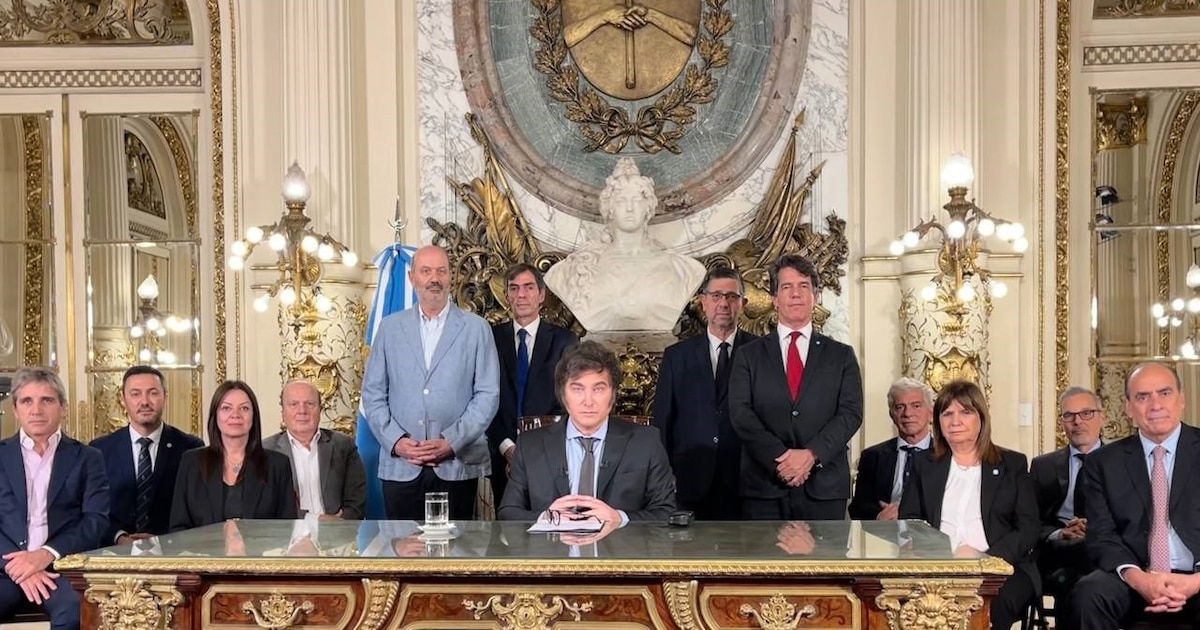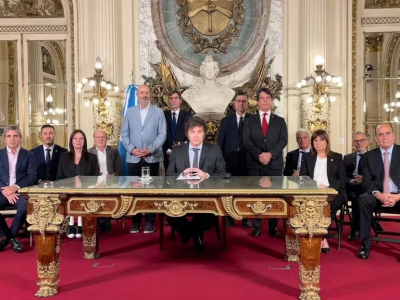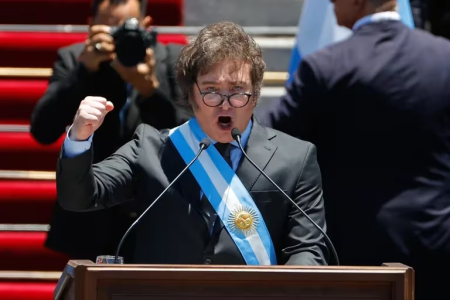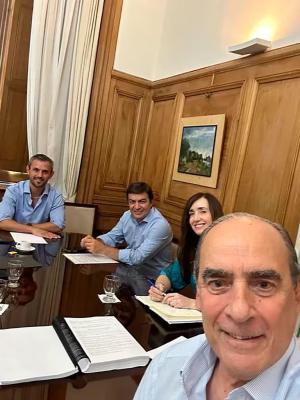Val
New member
The Government refuses to send the ministers to Deputies to explain the “omnibus law” and the start of the debate is complicated - Infobae

Source:

 www.infobae.com
www.infobae.com
January 08, 2024
The opposition demanded the presence of the main Cabinet officials, but at Casa Rosada they agreed to send undersecretaries and directors or present by videoconference. There is discomfort and criticism from allied sectors. Milei's statements worsened the political climate.
By Facundo Chaves

Requests by Deputies. Javier Milei and his Cabinet
Within hours of the beginning of the treatment of the so-called “omnibus law”, which in 664 articles includes a central part of the government plan of, parliamentary sources with extensive legislative experience confided last night.Never seen, in the Chamber of Deputies the only thing that abounds is uncertainty about the format that the debate will have in the committees. The main unknown has to do with who will go on behalf of the Casa Rosada to explain the foundations and details of the mega project. "We do not know anything. We ask for ministers and they say that they are going to send undersecretaries and directors. Javier Milei.
Last Friday, late in the afternoon, the authorities of the Chamber headed by the libertarian Martín Menem decided to call for tomorrow, Tuesday, between 2 and 8 p.m., the first meeting joint briefing of the General Legislation, Budget and Finance and Constitutional Affairs commissions to begin discussing within the framework of the extraordinary sessions called by the Executive the project “Bases and Starting Points for Freedom of the Argentines”, known as the “omnibus law”.
In the official note signed by the General Legislation Commission, chaired by Gabriel Bornoroni, in addition to the call, it was reported that “officials from the Executive Branch will attend, who may be present or connect remotely; For these purposes, the deputies may send questions that they deem appropriate” to an email address of the Chamber of Deputies.
José Luis Espert at the first meeting of the Budget and Finance Commission of the Chamber of Deputies
From the moment the email notifications arrived, the deputies began to demand in this way and through informal contacts with national government officials that the ministers be the ones to go in person to the committees to explain the content of the voluminous bill. which was written and compiled by the presidential advisor without portfolio, Federico Sturzenegger, and a team of lawyers and experts of, for now, unknown origin.
These requests were responded to, according to what was learned Infobae from parliamentary sources, that the majority of the ministers were not willing to appear to the Deputies' commissions - at least not in person - and that only some of those officials would accept, as long as it was remotely, by videoconference, or in writing. “It is a law that we did not write,” they say they responded in those informal talks.
In the Chamber of Deputies, Kirchnerism and also allies such as the majority of the PRO and the UCR, request the presence to explain the “omnibus law” of the Chief of Staff, Nicolás Posse, the Minister of Economy, Luis “Toto” Caputo, and the Minister of Human Capital, Sandra Pettovello. They are the most requested officials because they have the most topics in their area in the 664 articles of the “omnibus law.”
According to the same sources, “from the Economy they offered that undersecretaries go and from Human Capital an undersecretary and two directors; the rest did not answer.”

President Milei, the day he took office and spoke with his back to the National Congress
“As much as we are doing a phenomenal job, when Congress starts doing stupid things, it costs you the bill in terms of the fact that they did not accompany the bond tender and that resulted in the country's risk going up and the dollar taking a hit. small leap,” said the president. And contrary to political logic, Milei raised the tone of his criticism of deputies and senators at a time when he will most need potential allies to make up for the lack of “his own” representatives.
The fact is that in the lower house La Libertad Avanza has 38 out of 257 seats and in the Senate, only 7 out of a total of 72. The statements on radio Miter seemed to highlight the value of the fact that without the UCR, the PRO and a sector of Peronism the measures They can get bogged down.
“Politicians have to become aware that if we do not do what needs to be done, they will be plunging society into an enormous crisis and causing truly abysmal pain. Let it be clear to them that they are responsible, I did what I have to do: I sent the adjustment program, a very orthodox shock program, with fiscal adjustment, sanitation of the Central Bank, exchange rate honesty, and I sent a set of structural reforms by DNU, under the logic of the emergency law, and I sent the law 'Bases and starting points for the freedom of Argentines'. “We did what we had to do, now we wait for the response from politics,” he stated.
But it was not the president's only attack with Congress. “The problem is in politics, in caste, in those who lose the benefits, who are those who have the most access to complain. The prebendary businessmen are going to complain, the thieving politicians are going to complain, the journalists who lived off the agenda are going to complain, the professionals complicit in all this scam are going to complain,” he assured.
And he attacked the deputies and senators: “Many politicians who want to split the DNU, who want to discuss it, and why do they want to do it? Because they want to cheat with that. Go and see who are the politicians who ask to divide these things and you will see that behind that there is a sector, look for the terminal and the link of that politician with that terminal.” “Let's see if these politicians live a standard of living commensurate with what they earn as politicians. We are also going to start reviewing the flows and we are going to review the stocks,” he warned.
They then asked him if he was willing to establish some type of political negotiation with the opposition sectors that ask for openness: “We do not negotiate anything. Yes, we accept suggestions for improvement, but we do not negotiate anything. The difference is subtle,” he clarified.

The Minister of the Interior, Guillermo Francos, together with Martín Menem, Omar De Marchi and Victoria Villarruel
The statements of both are in line with the same political decision: to show a government with a single direction at the beginning of the discussion in Deputies. The thing is that Kirchnerism will try to block and delay the debate, while the UCR, the PRO and the bloc chaired by Miguel Ángel Pichetto will seek to clarify some more controversial aspects of the “omnibus law”, mainly the broad delegation of powers to the President for two years. , with the possibility of renewing it for two more years.
www.buysellba.com

Source:

El Gobierno rechaza enviar a los ministros a Diputados para explicar la “ley ómnibus” y se complica el inicio del debate
La oposición reclamó la presencia de los principales funcionarios del Gabinete, pero en Casa Rosada aceptaron enviar subsecretarios y directores o exponer por videoconferencia. Hay malestar y críticas de sectores aliados. Las declaraciones de Milei empeoraron el clima político
January 08, 2024
The opposition demanded the presence of the main Cabinet officials, but at Casa Rosada they agreed to send undersecretaries and directors or present by videoconference. There is discomfort and criticism from allied sectors. Milei's statements worsened the political climate.
By Facundo Chaves

Requests by Deputies. Javier Milei and his Cabinet
Within hours of the beginning of the treatment of the so-called “omnibus law”, which in 664 articles includes a central part of the government plan of, parliamentary sources with extensive legislative experience confided last night.Never seen, in the Chamber of Deputies the only thing that abounds is uncertainty about the format that the debate will have in the committees. The main unknown has to do with who will go on behalf of the Casa Rosada to explain the foundations and details of the mega project. "We do not know anything. We ask for ministers and they say that they are going to send undersecretaries and directors. Javier Milei.
Last Friday, late in the afternoon, the authorities of the Chamber headed by the libertarian Martín Menem decided to call for tomorrow, Tuesday, between 2 and 8 p.m., the first meeting joint briefing of the General Legislation, Budget and Finance and Constitutional Affairs commissions to begin discussing within the framework of the extraordinary sessions called by the Executive the project “Bases and Starting Points for Freedom of the Argentines”, known as the “omnibus law”.
In the official note signed by the General Legislation Commission, chaired by Gabriel Bornoroni, in addition to the call, it was reported that “officials from the Executive Branch will attend, who may be present or connect remotely; For these purposes, the deputies may send questions that they deem appropriate” to an email address of the Chamber of Deputies.
José Luis Espert at the first meeting of the Budget and Finance Commission of the Chamber of Deputies
From the moment the email notifications arrived, the deputies began to demand in this way and through informal contacts with national government officials that the ministers be the ones to go in person to the committees to explain the content of the voluminous bill. which was written and compiled by the presidential advisor without portfolio, Federico Sturzenegger, and a team of lawyers and experts of, for now, unknown origin.
These requests were responded to, according to what was learned Infobae from parliamentary sources, that the majority of the ministers were not willing to appear to the Deputies' commissions - at least not in person - and that only some of those officials would accept, as long as it was remotely, by videoconference, or in writing. “It is a law that we did not write,” they say they responded in those informal talks.
In the Chamber of Deputies, Kirchnerism and also allies such as the majority of the PRO and the UCR, request the presence to explain the “omnibus law” of the Chief of Staff, Nicolás Posse, the Minister of Economy, Luis “Toto” Caputo, and the Minister of Human Capital, Sandra Pettovello. They are the most requested officials because they have the most topics in their area in the 664 articles of the “omnibus law.”
According to the same sources, “from the Economy they offered that undersecretaries go and from Human Capital an undersecretary and two directors; the rest did not answer.”

President Milei, the day he took office and spoke with his back to the National Congress
More complicated dialogue
To this scenario of tension and worsening of the growing political climate, were added the explosive statements of the president, who once again said that there are legislators who ask for bribes to give their vote, while blaming Congress for the latest bad economic data, and stated that he is not willing to negotiate any of the initiatives that are in Parliament.“As much as we are doing a phenomenal job, when Congress starts doing stupid things, it costs you the bill in terms of the fact that they did not accompany the bond tender and that resulted in the country's risk going up and the dollar taking a hit. small leap,” said the president. And contrary to political logic, Milei raised the tone of his criticism of deputies and senators at a time when he will most need potential allies to make up for the lack of “his own” representatives.
The fact is that in the lower house La Libertad Avanza has 38 out of 257 seats and in the Senate, only 7 out of a total of 72. The statements on radio Miter seemed to highlight the value of the fact that without the UCR, the PRO and a sector of Peronism the measures They can get bogged down.
“Politicians have to become aware that if we do not do what needs to be done, they will be plunging society into an enormous crisis and causing truly abysmal pain. Let it be clear to them that they are responsible, I did what I have to do: I sent the adjustment program, a very orthodox shock program, with fiscal adjustment, sanitation of the Central Bank, exchange rate honesty, and I sent a set of structural reforms by DNU, under the logic of the emergency law, and I sent the law 'Bases and starting points for the freedom of Argentines'. “We did what we had to do, now we wait for the response from politics,” he stated.
But it was not the president's only attack with Congress. “The problem is in politics, in caste, in those who lose the benefits, who are those who have the most access to complain. The prebendary businessmen are going to complain, the thieving politicians are going to complain, the journalists who lived off the agenda are going to complain, the professionals complicit in all this scam are going to complain,” he assured.
And he attacked the deputies and senators: “Many politicians who want to split the DNU, who want to discuss it, and why do they want to do it? Because they want to cheat with that. Go and see who are the politicians who ask to divide these things and you will see that behind that there is a sector, look for the terminal and the link of that politician with that terminal.” “Let's see if these politicians live a standard of living commensurate with what they earn as politicians. We are also going to start reviewing the flows and we are going to review the stocks,” he warned.
They then asked him if he was willing to establish some type of political negotiation with the opposition sectors that ask for openness: “We do not negotiate anything. Yes, we accept suggestions for improvement, but we do not negotiate anything. The difference is subtle,” he clarified.

The Minister of the Interior, Guillermo Francos, together with Martín Menem, Omar De Marchi and Victoria Villarruel
Hard vs dialogue
This reaction that Milei had occurred simultaneously with the expressions given by the Minister of the Interior, Guillermo Francos, who also set limits on a political negotiation, although in his case in terms of time. “We don't have time, if we start discussing a law that will take us all year, not one more peso will enter Argentina, no one will invest, and we need investments, otherwise everything stops,” said the minister.The statements of both are in line with the same political decision: to show a government with a single direction at the beginning of the discussion in Deputies. The thing is that Kirchnerism will try to block and delay the debate, while the UCR, the PRO and the bloc chaired by Miguel Ángel Pichetto will seek to clarify some more controversial aspects of the “omnibus law”, mainly the broad delegation of powers to the President for two years. , with the possibility of renewing it for two more years.
www.buysellba.com

